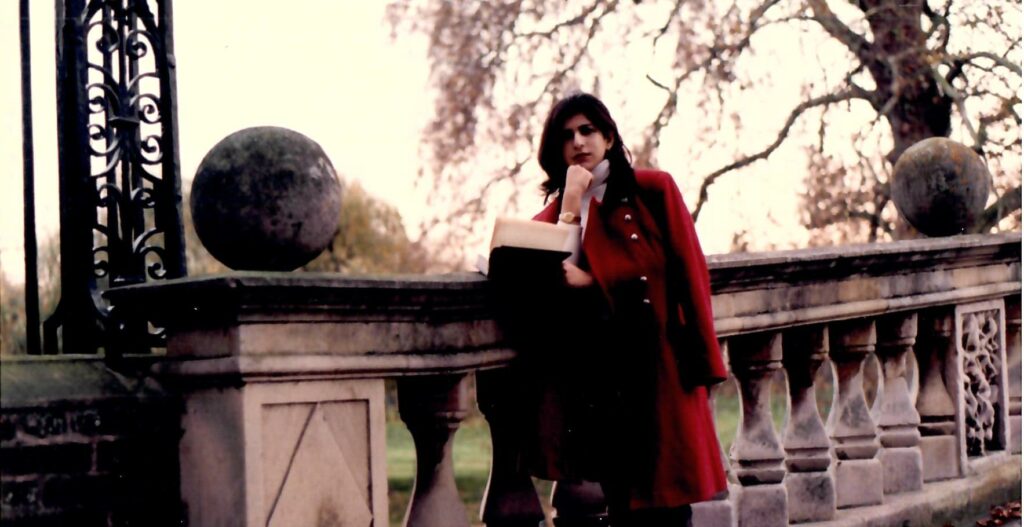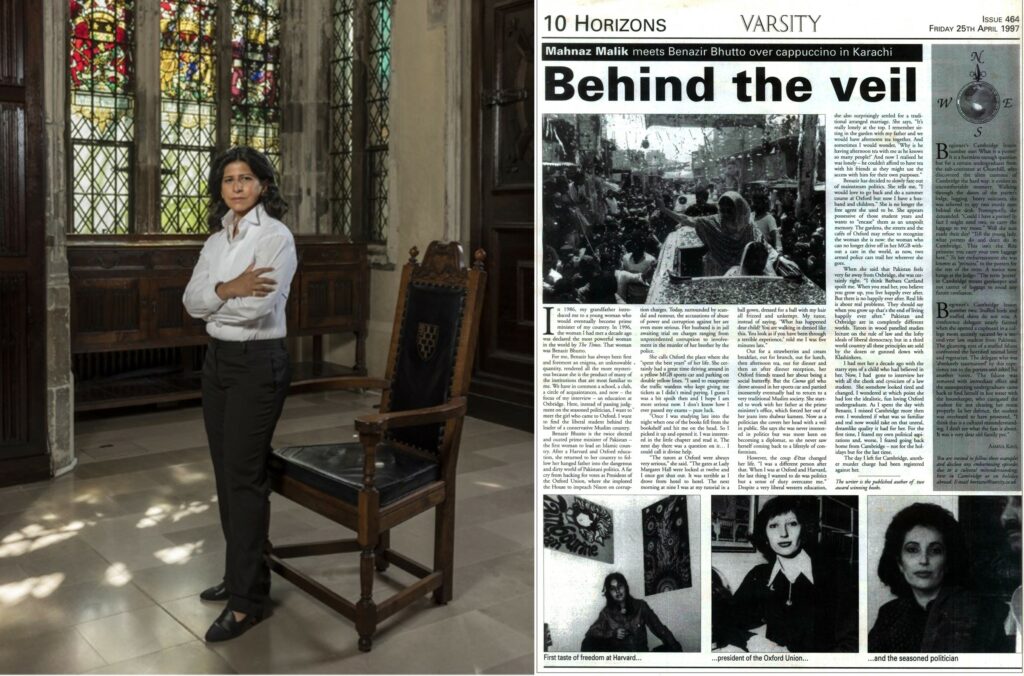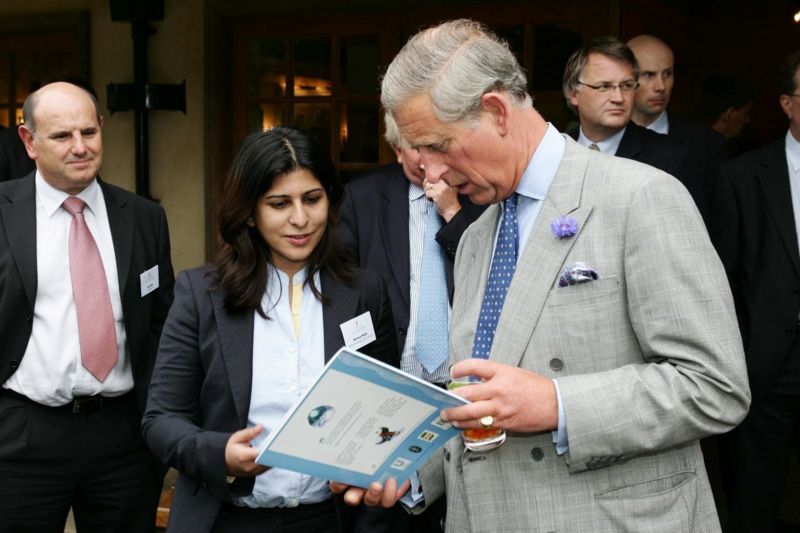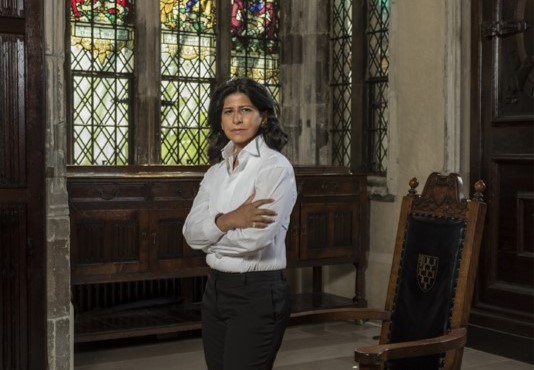Hughes Hall Fellow and Arbitrator, Mahnaz Malik, reflects on a truly inspiring journey 26 years after starting her undergraduate law degree here.
Our College Fellowship is unique, comprising senior academics and professionals from inside and outside academia. It is the breadth and diversity of their experience, expertise and networks that help make Hughes Hall the innovative, impactful and progressive learning community it is today. Ms Mahnaz Malik is no exception. Her story is one of enormous ambition, determination and achievement of a truly global nature.
Mahnaz’s story has recently been depicted in warm and inspiring detail by BBC News (Urdu) and an introduction to this follows here. It particularly recounts the enormous inspiration and support provided to Mahnaz during her first meeting with Benazir Bhutto at an early age; a friendship that wove in and out of her life as she grew, increasingly determined to make a difference, like other strong women who came before her, paving the way for her own successes.
Hers is a story that has taken her full circle, from studying law in Cambridge as a young international student on a full scholarship, inspired to change Pakistan, to arbitrating complex international disputes and providing strategic direction at a Cambridge college as a Fellow, inspiring a new generation to change the world.
“When I was eight, Benazir Bhutto visited my grandfather’s house. My grandfather said that she would be the Prime Minister of Pakistan in the future but I could not understand then how a woman would be the Prime Minister given the position of women in the country I could observe, even at that young age. When she arrived, she insisted on meeting everyone, including the children. My (male) cousins were delighted to receive autographs with “best wishes”. When my turn came, she wrote me a special message above her signature: “Mahnaz will do great things for her country.” Those words were just for me. They made me believe I was capable of creating positive change.”

Mahnaz at 18, whilst studying law at Churchill in Cambridge: “Cambridge is hard work and, as I had a full scholarship, all my focus was on my studies, but when I continued my legal studies in London, finished and became a trainee barrister, I taught law students to help meet my expenses at that time.”
Mahnaz was born in Pakistan, educated at Cambridge, and spent most of her life in the UK. She is a Barrister and Arbitrator with more than two decades’ experience advising governments, corporations and international organisations on international investment law issues and disputes, and is qualified to practise law in the US, UK and Asia. She also has literary awards in addition to numerous law awards, as well as trying her hand at film production, having authored a number of children books which have been translated and published in English, Urdu and Arabic.
Her personal story and professional journey are rich with challenge, recognition, and events of enormous significance, as much for Mahnaz as for the advancement of women from diverse backgrounds. Mahnaz talks passionately about being a successful cultural chameleon:
“I’m culturally amphibious. I belong to Britain and Pakistan. I can thrive in different countries”.
At 13, her story won the SAARC (South Asian Association Regional Cooperation) gold medal, which was presented to her by the Prime Minister of India:
“I still find it ironic that the then Indian Prime Minister, Narasimha Rao, gave me my first award. To his credit, he was gracious and welcoming to me despite the tense diplomatic relations between India and Pakistan at the time. This left an incredibly positive impression on the importance of cultural exchanges, which often cut across political boundaries. This is also what I value about the international community we have at Hughes Hall and Cambridge. Residential colleges allow us to live and grow together despite our cultural and political differences.”
At 18, when Mahnaz arrived at Cambridge, she was already the author of two award-winning books. Varsity paid her the rare compliment of interviewing her. Although she read law at Churchill, Mahnaz continued with her first love – writing. One of her stories was performed on the BBC World Service; another won a literary prize; and a third was made into a short film that launched the Raindance Film Festival’s children category. As a section editor at Varsity, she interviewed Benazir Bhutto, then the world’s youngest female Prime Minister.

Mahnaz Malik today, in Chambers, alongside the original article she wrote for Varsity in 1997 of her interview with Benazir Bhutto, ten years before her assassination. Photo credit: Grant Smith Photography
At 24, Mahnaz won the Law Society’s National Trainee Lawyer of the Year Award, followed by the City of London’s Wig and Pen Pro Bono Prize. At 28, she wrote a children’s book, translated into Urdu and Arabic. By 30, Mahnaz won the Financial Times Legal Innovator of the Year Award for establishing charities and legal organisations, including one which released over 300 children from detention in Pakistan.
She spent her thirties as Counsel in landmark international legal cases practising from the leading Twenty Essex Chambers in London. At 40, she became the youngest woman appointed as a judge on the World Bank’s ICSID annulment committee. That same year, she met girls learning to become boxers in Lyari, one of South Asia’s worst slums. Their enthusiasm and talent inspired her to establish a tournament and help sponsor their training.
At 44, she returned to Cambridge as a Governing Body Fellow at Hughes Hall, Cambridge, and subsequently joined the College Council:
“The BBC’s interview reminded me of one of my reasons for returning to Cambridge. I interviewed Benazir Bhutto for Varsity when I was an undergraduate. I remember her telling me how precious her time at Oxford was and that she longed to return in some capacity, but she had an election to contest. Sadly, she was assassinated. I connected with Benazir at a personal level and was never involved in her politics. Her encouraging and kind message to me as an eight-year girl stayed with me.”
“I learnt how important it is to inspire young people. Not all of us become powerful politicians, but we all have the capacity to create positive change in different measures. I am apolitical. As an arbitrator, I am conscious of deciding disputes to the best of my ability without fear or favour.”

Mahnaz meets Prince Charles, now King Charles III, in London to discuss the recent publication of her children’s books, and the awards she received for her writing.
“As I re-read my interview of Benazir, I realised she was the age I am now when she gave that interview. It resonated with me in a way I could not understand as a twenty-year-old. I am so glad I had the privilege of returning to Cambridge as a Fellow at Hughes. I love interacting with a new generation to see the wonder about the future in their eyes. In some ways, so little has changed, and in others, so much. I am also both relieved and delighted that I am still just about able to play a chukka of polo with the Cambridge University Polo Club.”
The full story of Mahnaz’s inspiring experiences and achievements can be read on BBC News (Urdu) by kind permission: www.bbc.com/urdu/articles/ckkqke6r0y0o (click translate to convert to English).
- For further information on Mahnaz Malik’s legal work, and to get in touch, see: www.twentyessex.com/people/mahnaz-malik/
- For all other queries: www.mahnazmalik.com.
- For Mahnaz on LinkedIn: https://uk.linkedin.com/in/mahnaz-malik
16.05.23





